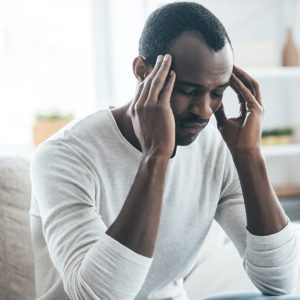Start Your Situational Anxiety Consultation
Complete a quick and easy questionnaire and one of our prescribers will make sure this treatment is right for you.

4.6/5 Trustpilot Rating

Trusted UK Registered Pharmacy

Takes Under 2 Minutes

Secure and Confidential

Justin Dicks
Superintendent Pharmacist
GPhC Number 2038305
Treatments
Related Medication
Frequently Asked Questions
Have a question? We're here to help
What Is Situational Anxiety?
Situational anxiety is where your anxiety is triggered by specific situations. These can be short-term situations such as walking through a busy crowd, or being in a packed lift, or major life situations, such as getting married or moving house.
What Causes Situational Anxiety?
Situational anxiety can be triggered by many different things and will be different for everyone. We all feel anxious to some degree when in stressful or tense situations, the difference between this and situational anxiety is that the reaction is often disproportionate to the situation. For example, sweating, nausea, rapid breathing, confusion, dizziness, and the inability to continue the task at hand.
How Can I Prevent Situational Anxiety?
Situational anxiety and mental health issues of any kind are often complicated and highly personal, treatment should be discussed with your doctor and is often a combination of therapy and medication to help relieve symptoms and manage triggers. If you are suffering with situational anxiety, you should contact your doctor or GP or make use of e-Surgery’s free to use ‘ask a pharmacist’ service.
Is There Medication I Can Use To Treat Situational Anxiety?
Some doctors may suggest certain medications to deal with the anxiety symptoms. This will depend on the individual and their specific needs.
Where Can I Get Treatment For Situational Anxiety?
You can begin to seek out treatment by contacting your doctor or GP. At e-Surgery we can offer a limited amount of medication that is sometimes used to treat situational anxiety if you have been prescribed it by your GP in the past.
Do I Need A Prescription To Access Treatment Online?
You will need to have previously been taking the medication and have had it approved by your GP. Our UK based prescribers can provide you with a private prescription online for your treatment.
How Will My Medication Be Delivered?
Your treatment will be sent from our UK based private pharmacy and sent via the Royal Mail to a delivery location of your choice in plain, discreet packaging.
How Long Does Situational Anxiety Last?
Situational anxiety usually lasts the length of time that you are exposed to a situation or environment that is causing the anxiety, such as a job interview or public speaking. You may still experience side effects afterwards for up to an hour or so, but these should go away naturally with time. Situational anxiety usually lasts between 30 minutes and a couple of hours, but this can be different with each person. If you experience anxiety for extended durations, then this might be a sign that your condition may not be situational and be more generalised.
Is Situational Anxiety Hereditary?
While it isn’t fully known why some people develop anxiety disorders, it’s believed that genetics can play a role in the likelihood of their development. If you have a family history of mental health issues or conditions then it’s likely that your genetics are contributing factors to your condition, though this isn’t the same for everyone. Environmental factors such as your childhood, general life experiences and your environment can all lead to anxiety orders and sometimes your genetics can make you predisposed to developing situational anxiety as a response to traumatic experiences.
Is Situational Anxiety Normal?
Yes, many people experience situational anxiety and it’s more common than not. Some people may experience more severe symptoms than others, but most of us will experience situational anxiety at some point in our lives. Example scenarios of situational anxiety include first dates, starting a new job or speaking to a police officer. There are ways to reduce the symptoms of situational anxiety, such as naturally through breathing exercises, or through medications like Propranolol tablets.
Does Situational Anxiety Get Better Over Time?
Time can help improve situational anxiety for some, but not everyone. Using medication or natural techniques to improve symptoms over time may help reduce the severity of the symptoms. Time does not always heal and can sometimes cause the condition to worsen if not managed correctly.
Can Exercise Help with Situational Anxiety?
Yes, exercising regularly can help reduce the symptoms of situational anxiety as it releases endorphins in the body that can lift your mood and reduce feelings of stress. Exercise can also help improve energy levels, sleep quality and improve overall physical and mental wellbeing. All of which can improve confidence and self-esteem, therefore reducing the likelihood of developing situational anxiety.
Can Situational Anxiety Lead to Panic Attacks?
Yes, panic attacks can sometimes be the next stage of the symptoms of situational anxiety, this is due to the intensity of the emotions felt and can cause the body to enter fight or flight mode, leading to increased heart rate, nausea, dizziness and a choking sensation that makes it hard to breathe. Panic attacks can be damaging to your mental health, but they aren’t considered life threatening, though during them they can feel like they are. If you have had a panic attack you should stay where you are, breathe slowly and deeply, keep calm and do things that make you feel relaxed. If you have frequent panic attacks you might have panic disorder, so you should speak to your GP as soon as possible.
Is Situational Anxiety Different to General Anxiety?
Situational anxiety is a sensation that most people experience in their lives, as it occurs during moments or scenarios where anxious thoughts are more common, such as a job interview or on a date with a potential partner. The symptoms usually fade away once the stressful situation is over, whereas general anxiety is where people experience anxiety in everyday life doing normal tasks, which makes it harder to manage because it’s unpredictable. If you feel you have a more generalised form of anxiety, you should speak to your GP as it would require different forms of medication and therapy.
Can You Treat Situational Anxiety at Home?
You can do things to try to improve situational anxiety at home, but they might not be completely effective. You can try meditation, breathing techniques, relaxation methods and mental practices that can all contribute to the reduction of situational anxiety symptoms. If these methods do not work, you can take medication that is designed to reduce the severity of situational anxiety and allow you to partake in the scenarios without it stopping you from participating.
Does Caffeine Make Situational Anxiety Worse?
Yes, drinking too much caffeine can amplify symptoms of anxiety including an increase in heart rate, trembling, sweating and jitteriness. Drinking excessive caffeine can cause these symptoms to increase and contribute to situational anxiety, and possibly even panic attacks if you do not regularly consume caffeine and suffer with situational anxiety. It’s advised that you have a heathier, and balanced diet as your physical health is linked directly with your mental health.



















